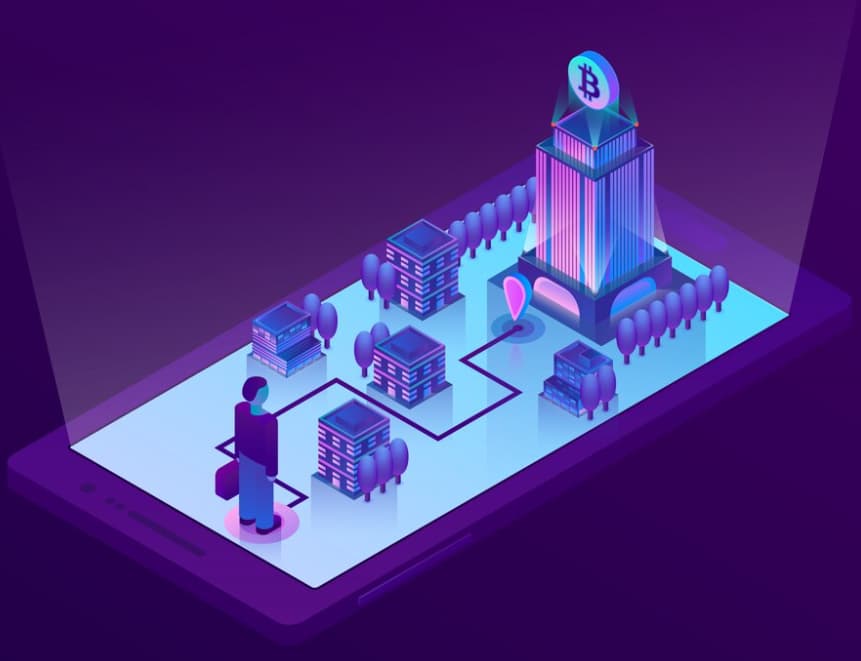The integration of blockchain technology is reshaping the landscape of real estate financing, including the mortgage sector. This innovative technology offers a distributed, impenetrable, and transparent infrastructure, enhancing the way mortgages are processed. It serves as a reliable repository for all pertinent mortgage-related information, encompassing borrower profiles, property specifics, and chronological payment records within a robust ledger system resistant to manipulation. Furthermore, blockchain technology streamlines the execution of contracts and could potentially replace traditional title and escrow services with more streamlined solutions.
The adoption of blockchain in mortgage financing is not without its complexities. As loan providers navigate this pioneering technology, they must balance the promise it holds with the practicalities of integrating it into existing systems. This exploration will delve into the workings of blockchain technology and its burgeoning application within the realm of mortgage transactions.
Understanding Blockchain’s Mechanisms
Blockchain technology is often hailed as a groundbreaking innovation in the world of digital ledger systems, characterized by its decentralized and distributed architecture. This technology fundamentally transforms the approach to data management, offering a level of security that is significantly superior to traditional centralized databases. The inception of blockchain technology can be traced back to the creation of Bitcoin, a digital currency that introduced a new paradigm for financial transactions without the need for central authorities. Since then, the potential applications of blockchain have expanded far beyond cryptocurrencies. Various industries are now exploring the benefits of blockchain, utilizing platforms such as Ethereum that provide customizable solutions.
These platforms enable the development of smart contracts and decentralized applications (dApps), showcasing the technology’s flexibility in adapting to diverse requirements across different sectors. This adaptability highlights the broad spectrum of possibilities that blockchain technology brings to the table, from enhancing transparency in supply chains to securing personal data against breaches.
Blockchain Revolution in Mortgages
The transformative impact of blockchain technology on the mortgage sector marks a significant departure from traditional practices, heralding a new age of security, efficiency, and transparency. The role of blockchain extends well beyond simple financial transactions, offering an all-encompassing solution to the intricacies and challenges inherent in mortgage processing. Here’s an in-depth look at the ways blockchain is revolutionizing the mortgage industry:
- Streamlined Contracts through Smart Technology: At the heart of blockchain’s impact are smart contracts, which simplify the mortgage process by automating the execution of agreements. These digital contracts embed the terms and conditions directly within their code, facilitating automatic execution when specific, pre-agreed conditions are met. This not only speeds up the process but also reduces the potential for human error, making transactions smoother and more reliable;
- Immutable Ownership Records Enhance Trust: One of blockchain’s most significant contributions is its ability to maintain secure and unalterable records of property ownership. This feature significantly reduces the likelihood of disputes and fraud, as the blockchain acts as a transparent and immutable ledger, providing undeniable proof of ownership. Such transparency not only strengthens trust among all parties involved, including buyers, sellers, and financial institutions, but also streamlines the transfer of ownership, making it more straightforward and less susceptible to challenge;
- Document Verification and Integrity: Blockchain technology also plays a crucial role in verifying the authenticity of critical mortgage documents, such as income statements, credit reports, and property titles. It employs cryptographic techniques to validate the integrity and authenticity of these documents, thereby significantly lowering the risk of forgery and other fraudulent activities. This level of authentication ensures that all parties are basing their decisions on accurate and verified information, thereby enhancing the overall security of the mortgage process;
- Tokenization Opens New Investment Avenues: Furthermore, blockchain introduces the concept of tokenization to the mortgage industry, allowing assets related to mortgages to be divided into digital tokens. This innovation facilitates investment from multiple parties in a single property, improving the liquidity and accessibility of property investments. It does so while upholding stringent security protocols, ensuring that investments are both secure and compliant with regulatory standards.
The incorporation of blockchain into the mortgage sector signifies a shift towards a more secure, transparent, and efficient operational framework. By capitalizing on the distinct advantages offered by blockchain technology, industry stakeholders are better equipped to navigate the complexities of the mortgage process. This shift not only fosters innovation but also enhances reliability, promising a future where the mortgage industry can operate with greater confidence and efficiency.
Mortgage Efficiency with Blockchain Technology

Implementing blockchain technology within the mortgage industry offers a multitude of advantages, reshaping conventional mortgage procedures while enhancing security and transparency.
Blockchain brings forth:
- Immutable Record-Keeping: Utilizing blockchain as a ledger ensures the secure storage of all pertinent mortgage details. Documents can be securely stored within the blockchain, eliminating the necessity for external records management;
- Automated Smart Contracts: Self-executing contracts, facilitated by blockchain, streamline the mortgage journey from approval to repayment by automating predefined terms and conditions;
- Streamlined Document Management: Blockchain minimizes reliance on physical paperwork, providing a centralized storage solution where authorized parties can seamlessly access documents, reducing the risk of misplacement;
- Cost-Efficiency: By eliminating the necessity for intermediaries such as title companies and escrow services, blockchain reduces operational costs significantly. This reduction may lead to substantial savings by minimizing the need for human intervention in the process.
Secure and Transparent Mortgage Transactions
Blockchain technology offers a robust solution to enhance both security and transparency in mortgage transactions, providing a shield against fraud and ensuring data integrity. Here’s how:
- Fraud Prevention: The tamper-resistant nature of blockchain technology makes it highly challenging for malicious actors to manipulate records, thus significantly reducing instances of fraud, identity theft, and other illicit activities;
- Secure Data Encryption: Through the use of cryptography, blockchain ensures that all aspects of the mortgage process are safeguarded from unauthorized access, bolstering security across the board;
- Enhanced Accessibility: As a decentralized technology, blockchain enables seamless management of mortgage transactions across state lines and international borders from a unified database, facilitating smoother operations and reducing logistical hurdles;
- Regulatory Compliance: Real-time access to transaction data empowers regulatory authorities to monitor compliance effectively, thereby minimizing instances of non-compliance or enabling prompt intervention when necessary;
- Improved Data Quality: Blockchain’s inherent transparency fosters better data accuracy by allowing multiple authorized stakeholders to access and verify data from a single source. This reduces discrepancies commonly encountered in systems with multiple databases, enhancing overall data integrity.
Companies Using Blockchain for Mortgage Transactions
While the mortgage industry predominantly adheres to traditional processing methods, a select number of avant-garde mortgage entities are integrating blockchain technology into their operations, signaling an emerging trend.
- Figure: Figure is revolutionizing the mortgage landscape by enabling borrowers to leverage their Bitcoin or Ethereum holdings to secure a 30-year fixed-rate mortgage with no cash outlay. Their innovative Crypto Mortgage PLUS offering permits borrowers to retain their digital assets while obtaining financing up to $3 million. Currently, this avant-garde service is available in select states;
- Liquid Mortgage: Liquid Mortgage facilitates a blockchain-based ecosystem connecting lenders with borrowers, ensuring the security of their data and streamlining the payment tracking and management process. The platform offers lenders the advantage of engaging with smart contracts and accessing data in real time.
Implications for Mortgage Professionals

As the financial industry evolves, mortgage loan originators (MLOs) are facing the potential integration of blockchain technology into their operations. This pivotal shift prompts a comprehensive evaluation of both the advantages and challenges associated with adopting this innovative technology. MLOs are urged to not only weigh the benefits and drawbacks carefully but also to commit to skill enhancement and compliance to continue delivering exceptional service. Below are expanded strategies to navigate this transition effectively.
- Comprehensive Education and Skill Development. Embracing blockchain technology necessitates a significant educational commitment from MLOs. Acquiring a deep understanding of how blockchain operates is essential. This knowledge will empower MLOs to adeptly navigate the evolving industry landscape, thereby enhancing their ability to provide superior service to their clients;
- Monitoring Evolving Regulatory Landscapes. As the mortgage industry transforms with the adoption of blockchain, regulatory frameworks are bound to adapt. MLOs must remain vigilant, keeping pace with the latest regulatory updates and guidelines that govern the use of blockchain within the industry. This proactive approach ensures both compliance and the ability to leverage technology to its fullest potential;
- Enhancing Client Communications. It is crucial for MLOs to effectively articulate the benefits of blockchain technology to their clients, emphasizing its potential to enhance security and efficiency within the mortgage process. By doing so, MLOs can build trust and confidence among borrowers, highlighting the value of adopting this technology;
- Fostering Collaboration with Technological Innovators. Engaging directly with blockchain developers offers MLOs invaluable insights into how blockchain technology can be seamlessly integrated into the mortgage origination process. This collaboration facilitates a deeper understanding of the technology’s capabilities and its practical applications within the industry;
- Commitment to Ongoing Awareness. The blockchain domain is characterized by rapid advancements and the emergence of new platforms. MLOs should dedicate themselves to staying informed about these developments, enabling them to make educated decisions regarding the adoption and implementation of blockchain technologies in their operations.
Conclusion
The incorporation of blockchain technology into the mortgage sector signifies a significant shift towards improved efficiency, transparency, and security. Leveraging blockchain’s unchangeable ledger, automated smart contracts, efficient document management, and cost-effectiveness, mortgage procedures are on the brink of a revolutionary change. Blockchain not only reduces the risk of fraudulent activities but also improves accessibility and ensures adherence to regulations. Despite persistent adoption hurdles such as the necessity for widespread education, monitoring regulatory developments, enhancing client communication, fostering collaboration with tech pioneers, and staying informed, mortgage originators are leading the charge in this transformation. By adeptly tackling these obstacles and embracing innovation, mortgage professionals can harness blockchain’s transformative capabilities to provide outstanding service and usher in a new era of trustworthiness and advancement in the mortgage sector.
